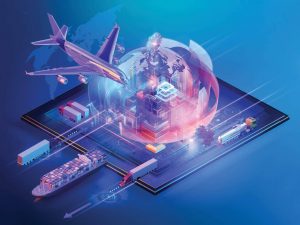Arun Kumar, President, AMTOI said, “While it’s important to recognise that each region has its unique strengths shaped by geography, history and economic evolution, drawing direct comparisons can often overlook context. India’s cargo and logistics market, despite being underappreciated historically, holds tremendous untapped potential. In recent years, the sector has gained much-needed visibility and attention from policymakers, with initiatives like the National Logistics Policy and PM Gati Shakti showing promise. However, to fully unlock India’s competitive advantage, far more needs to be done, from infrastructure enhancement and regulatory simplification to seamless multimodal integration and digitisation. In comparison, Southeast Asian nations offer strong competition. China has built one of the world’s most efficient logistics networks over the last two decades. City-states like Singapore and Hong Kong thrive on logistics as a core economic activity. Countries like Malaysia, Vietnam and Thailand have modelled themselves on their successful neighbours, creating efficient and export-oriented logistics systems.”
Read More »Streamline customs via ‘single window’ systems to enhance efficiency
Dilip Sahu, Director, EPS Worldwide Integrated Logistics said, “Next-generation cargo infrastructure requires a blend of regulatory reform, digital integration and public-private investment. Governments should streamline customs through ‘single window’ systems, harmonise trade documentation and mandate interoperable data standards to ensure seamless cargo visibility. Sustainability must be central, with incentives for zero-emission fleets, carbon accounting and green freight corridors supported by charging and refueling infrastructure. Public-private partnerships are critical for modernising ports, airports and inland hubs with automation, digital twins and AI-driven logistics planning, while also building multimodal freight corridors to reduce last-mile inefficiencies. National cargo data platforms, blockchain-enabled smart contracts and predictive analytics can enhance resilience and efficiency. Equally important are reskilling programs to prepare the workforce for automation and digital tools, alongside policy ‘sandboxes that enable testing of drones and autonomous vehicles. Ultimately, cargo modernisation depends on aligning private innovation with public policy to build sustainable, resilient and interconnected supply chains.
Read More »Lufthansa Cargo, Shein ink pact to drive sustainable air cargo ops
Lufthansa Cargo and Shein have signed MoU to explore a range of initiatives to drive the adoption of sustainable solutions for airfreight. The initiative is aligned with the e-commerce platform’s commitment to addressing its carbon footprint from transportation. As part of this initiative, Lufthansa Cargo will provide high-quality ‘Proof of Sustainability’ certificates for the used SAF quantities. These certificates are based on externally verified standards and document emission reductions, compared to conventional jet fuel, in a traceable manner. SAF use and fleet efficiency measures and process quality form the basis of this collaboration. “Signing this memorandum with Shein represents Lufthansa Cargo´s commitment to implementing high-performance logistics solutions responsibly and with operational excellence. It demonstrates the importance of concrete measures and reliable implementation in the international air freight business. Together with all stakeholders within the supply chain, we are driving the development of more sustainable global supply chains in line with our purpose: Enabling Global Business,” said Lufthansa Cargo’s CEO Ashwin Bhat.
Read More »Schmitz Cargobull expands its cold chain capabilities in India
Schmitz Cargobull AG has announced a strategic investment in Sub Zero Insulation Technologies (SZIT) and plans to strengthen its presence in the rapidly growing Indian cold chain logistics market. Under the agreement, Schmitz Cargobull will acquire a 27.5 per cent equity stake in SZIT, with an option to increase its shareholding over the coming years. This partnership marks a significant milestone in Schmitz Cargobull’s global expansion strategy. “India’s cold chain sector is evolving rapidly and Sub Zero has demonstrated strong potential to lead this transformation. By combining Schmitz Cargobull’s engineering expertise with Sub Zero’s market reach, we aim to deliver high-quality, efficient transport solutions across India and beyond. This is not just about business growth; it’s about enabling infrastructure that can help reduce the 30–40 per cent of perishable produce lost annually due to inadequate cold-chain facilities – losses that also contribute significantly to greenhouse gas emissions” said Andreas Schmitz, CEO Schmitz Cargobull AG.
Read More »CCUB 2025 back to boost innovation in cold chain biz
The upcoming CCUB event in Hyderabad on 18 and 19 September is set to bring together leading stakeholders from the logistics, supply chain and air cargo industries to deliberate on the future of temperature-controlled logistics in India. With demand for reliable cold chain infrastructure rising across sectors such as pharmaceuticals, perishables, food processing and e-commerce, the event will serve as a vital platform for industry leaders, technology providers, policy makers and logistics professionals to exchange insights, showcase innovations and explore new business opportunities. India, being one of the largest producers and exporters of perishable goods and a global hub for pharmaceutical manufacturing, requires robust cold chain systems to maintain product integrity, ensure compliance and meet international quality standards. Panel discussions, technical sessions and networking opportunities will cover critical topics such as sustainable cold chain models, integration of renewable energy, automation in warehousing and multimodal connectivity. The event will also provide insights into government initiatives and policy frameworks supporting cold chain development, with a focus on reducing logistics costs and enabling India’s vision of becoming a reliable global supply chain partner. By bringing together diverse voices from the cold chain ecosystem, the event will play a key role in shaping the roadmap for innovation-driven, efficient and sustainable cold chain solutions for India’s logistics and air cargo industry.
Read More »Improved road infra, EVs will reduce logistics cost’
Electric vehicles, technology, e-commerce will drive growth of the logistics industry and boost economic development of the country. We are developing sustainable MMLPs, e-highways, we are reducing cargo transit time, which will help reduce logistics cost. We are developing National highways, launching EVs it will automatically reduce cost. Automobile, aviation industries are also growing tremendously,” said Nitin Gadkari, Union Cabinet Minister for Road Transport and Highways, GoI while unveiling report titled, titled ‘Express Industry in India 2025: Powering India’s economy, connecting businesses and markets.’ He added, “We need to start electric cold chain trucks also. Electric vehicles are very cost effective.” The report commissioned by The Express Industry Council of India (EICI) and KPMG focused on the sector’s expansion from USD 3 bn in 2017 to USD 9 bn in FY 2025, recording a compound annual growth rate of 12-15 per cent. It projects that market will double to between USD 18 and 22 bn by FY 2030.
Read More »Air cargo demand from APAC to US surges: WorldACD
According to the latest report from WorldACD, volumes between Asia Pacific and the US showed signs of life in recent weeks, while from Europe, figures have weakened, potentially a sign of volumes rebalancing as a result of the US finalising more tariff arrangements. Figures from WorldACD show that chargeable weight between China and the US increased by 1 per cent in the week ending August 10 (week 32), following flat figures in week 31 and a 5 per cent increase in week 30. In addition, demand from China to the US increased by 5 per cent year on year in week 32 – the first increase compared with last year since mid-April. In contrast, export tonnage from Asia Pacific to Europe has now declined for four weeks in a row, led by declines from China, South Korea and Indonesia.
Read More »FedEx, IIT Madras opens SMART centre for logistics
Federal Express Corporation (FedEx) and the Indian Institute of Technology Madras (IIT Madras) have inaugurated the FedEx SMART Centre (Supply Chain Modelling, Algorithms, Research and Technology Centre) on the institute’s campus. The innovation hub will focus on developing sustainable, technology-driven logistics solutions. Backed by a five-year, $5 million grant from FedEx, the Centre will integrate cutting-edge research, advanced digital tools and industry expertise to reimagine supply chains for greater agility, resilience and environmental responsibility. The inauguration was led by Kami Viswanathan, President, Middle East, Indian Subcontinent and Africa (MEISA), FedEx, along with Nitin Navneet Tatiwala, Vice President, Marketing, Customer Experience and Air Network, MEISA, FedEx, Prof V Kamakoti, Director, IIT Madras and Prof Ashwin Mahalingam, Dean (Alumni and Corporate Relations), IIT Madras.
Read More »‘Improving quality, scaling up infra, embracing tech crucial’
The ongoing supply chain shocks, geopolitical tensions and tariff escalations have pushed the world toward regionalisation,” said Amit Maheshwari Founder & CEO, Softlink Global. He added, “in this context, India’s ‘Vocal for Local’ and ‘Make in India’ initiatives are not just patriotic slogans—they are strategic levers for resilience. But let’s be clear: shifting trade dynamics overnight is not easy. Indian manufacturers and exporters will need to adapt fast—by improving product quality, scaling up infrastructure and embracing digital technologies. This shift is less about self-reliance in isolation and more about strengthening India’s role as a dependable node in the global value chain. Technology will be the backbone of this transition. From factory automation to digital logistics platforms that unify documentation, compliance and trade finance, tech-led efficiency will define who thrives in the new era. Yes, the industry will cope. But only those who act, adapt and automate will lead. The world is rethinking trade. India must not just respond—we must lead.”
Read More »Jeena & Salesforce unite to drive digital transformation
Jeena & Company announced a strategic collaboration with Salesforce to accelerate its digital transformation journey forward. This collaboration will help Jeena & Company unlock deeper customer intelligence, data driven decision making and consistency across teams. As part of the first phase, Jeena & Company is deploying the Salesforce Sales Cloud to enhance sales visibility and enable faster, more integrated engagement across its logistics network. The platform will empower sales teams with real-time visibility across every stage of the deal cycle, helping drive quicker closures and improve conversion rates. With a single source of truth for customer data through Salesforce Cistomer360, Jeena & Company will deepen customer engagement, personalise outreach and unlock recurring revenue opportunities. With a legacy of over 125 years and presence across critical freight and logistics verticals, Jeena & Company is now future-proofing its operations by tapping into the full potential of Salesforce’s trusted, scalable and AI-ready platform. This marks a strategic shift from legacy systems to intelligent workflows that deliver connected, data-rich, and consistent experiences for customers and partners alike.
Read More » Cargo Breaking News
Cargo Breaking News









